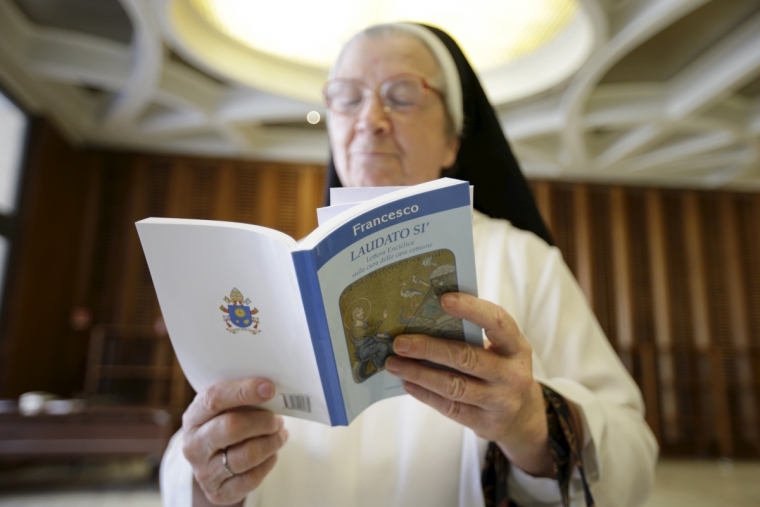Pope calls for redistribution of world's resources & criticizes capitalism, modern technology

ROME (Christian Examiner) – Pope Francis calls for redistribution of the world's resources "for the common good" in a new encyclical on global warming and climate change.
The encyclical, LAUDATO SI', mi' Signore, or "Praise be to you, My Lord," is a sweeping criticism of capitalism, modern technology, and political obstructionists who refuse to enact climate change legislation.
It also criticizes First World countries for their wastefulness, consumption of resources and pollution.
"The earth, our home, is beginning to look more and more like an immense pile of filth. In many parts of the planet, the elderly lament that once beautiful landscapes are now covered with rubbish," Francis writes.
Francis claims "a very solid scientific consensus" indicates the world is experiencing a climatic shift, complete with rising sea levels, water shortages, extreme weather events and global warming. While he claims other factors – natural events such as volcanic activity, changes in the solar cycle and the earth's wobble in orbit – affect the global climate, the pontiff clearly beliefs human beings are the root of the problem.
"Humanity is called to recognize the need for changes of lifestyle, production and consumption, in order to combat this warming or at least the human causes which produce or aggravate it," Francis writes.
"The problem is aggravated by a model of development based on the intensive use of fossil fuels, which is at the heart of the worldwide energy system. Another determining factor has been an increase in changed uses of the soil, principally deforestation for agricultural purposes."
"Obstructionist attitudes, even on the part of believers, can range from denial of the problem to indifference, nonchalant resignation or blind confidence in technical solutions. We require a new and universal solidarity."
According to the pontiff, who was shaped by his experiences as a priest among the poor in Brazil, global society is filled with injustices where people are deprived of their rights and "considered expendable." Francis claims the only way to correct this failing view of humanity is to, in solidarity, offer a "preferential option for the poorest of our brothers and sisters."
"This option entails recognizing the implications of the universal destination of the world's goods," Francis writes. "We need only look around us to see that, today, this option is in fact an ethical imperative essential for effectively attaining the common good."
Francis praises young people who have created organizations to address issues of climate change, but laments that efforts to achieve "concrete solutions" by power opposition groups. He also says the public has not expressed sufficient interest in the topic.
"Obstructionist attitudes, even on the part of believers, can range from denial of the problem to indifference, nonchalant resignation or blind confidence in technical solutions. We require a new and universal solidarity," Francis writes.
While the pope favors legislation to help limit the effects of climate change, he says the creation of a system of buying and selling so-called "carbon credits" will not solve the world's climate problems. He writes that he believes such a system would only create a new business of speculation and would not reduce the emission of greenhouse gases.
"Rather, it may simply become a ploy which permits maintaining the excessive consumption of some countries and sectors," Francis writes.
The pope's encyclical ends with a plea to Mary, whom he says "now cares with maternal affection and pain for this wounded world."
"Just as her pierced heart mourned the death of Jesus, so now she grieves for the sufferings of the crucified poor and for the creatures of this world laid waste by human power. Completely transfigured, she now lives with Jesus, and all creatures sing of her fairness. She is the Woman, 'clothed in the sun, with the moon under her feet, and on her head a crown of twelve stars' (Rev 12:1). Carried up into heaven, she is the Mother and Queen of all creation. In her glorified body, together with the Risen Christ, part of creation has reached the fullness of its beauty. She treasures the entire life of Jesus in her heart (cf. Lk2:19, 51), and now understands the meaning of all things. Hence, we can ask her to enable us to look at this world with eyes of wisdom.'"
Protestant theologians generally interpret the woman in Revelation 12:1 as a sign of the church, and not a reference to Mary becoming "co-redemptrix" with Christ.
RELATED ARTICLE:
Mohler says Pope's climate policy would devastate, not help the poor